#Authors Publish
Explore tagged Tumblr posts
Text

if it's good enough for you, then it deserves to be made. don't let anyone else decide if your story is worth it or not.
#this more for myself than anything#because i get so bogged down on if my story is good enough for other people and if others would like it#writeblr#creative writing#writers of tumblr#writerscommunity#writers#writer stuff#book tropes#novel writing#writing#writers on tumblr#bookblr#authors#book writing#writer#publishing#writing stuff#on writing#ao3 writer#female writers#writers and poets#writing life#writing memes
23K notes
·
View notes
Text
i think theres this idea in the general public that the "best" fanfic gets turned into real books like 50 shades of grey. but the truth is that the best fanfic can never be published as an actual book because its intricately woven into the canon material so its inseparable even if you change the names
#no shade (ha) to 50 shades. ive never actually read it so idk if its good#but imo the idea of creating an au fanfic thats so divorced from the original work is boring! why are you even making a fanfic atp#the only good fanfic is when you can tell the author loves the source material and uses it#the best fanfics ive ever read could never be published as actual books because it wouldnt work without the context of the original story
59K notes
·
View notes
Text
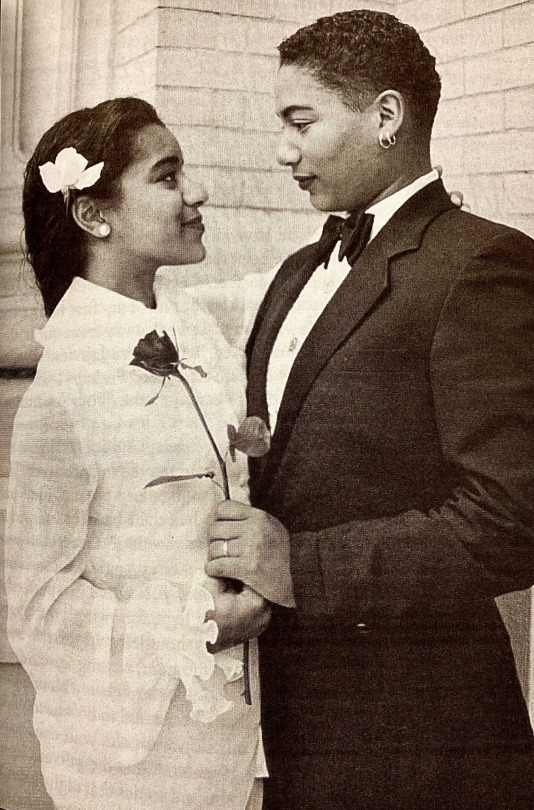
"Lesbian Weddings" by Wendy Jill York
source: The Femme Mystique, edited by Lesléa Newman
#lesbian literature#lesbian#dyke#thatbutcharchivist#archived#lesbian books#lesbian history#lesbian photography#black lesbian#black femme lesbian#black femme#black butch lesbian#black butch#stud lesbian#i pray i am using the term stud appropriately here#will edit if not#author: lesléa newman#year: 1995#publisher: alyson publications inc.#the femme mystique#photographer: wendy jill york#black lesbian couple#black couple#the gal on the left looks a little like my sister tsega ... i miss her so much 😭😭😭#femme4butch#femme4stud#butch4femme#stud4femme#femme#butch
31K notes
·
View notes
Text
Saw a fun little conversation on Threads but I don't have a Threads account, so I couldn't reply directly, but I sure can talk about it here!
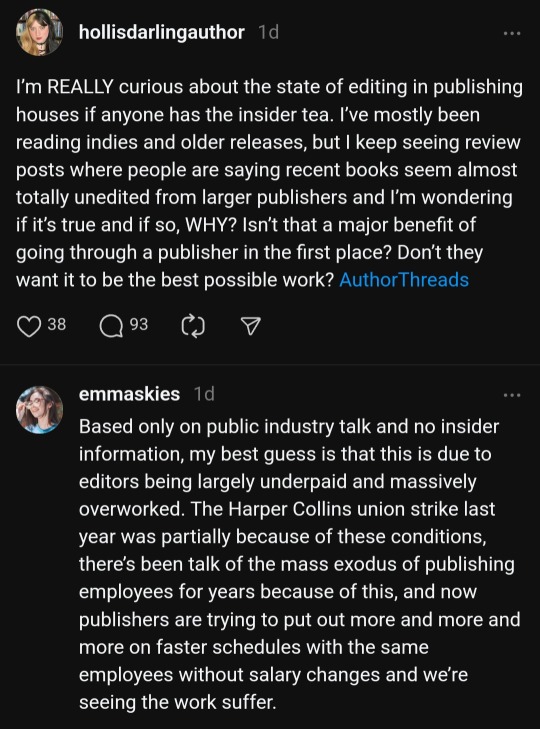
I've been wanting to get into this for awhile, so here we go! First and foremost, I wanna say that "Emmaskies" here is really hitting the nail on the head despite having "no insider info". I don't want this post to be read as me shitting on trad pub editors or authors because that is fundamentally not what's happening.
Second, I want to say that this reply from Aaron Aceves is also spot on:
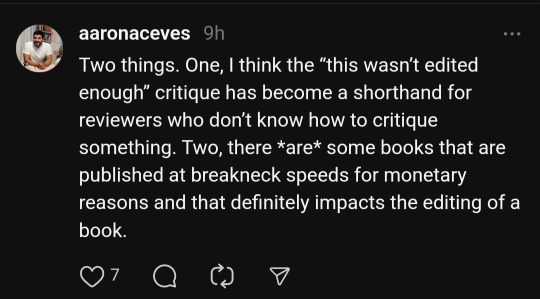
There are a lot of reviewers who think "I didn't enjoy this" means "no one edited this because if someone edited it, they would have made it something I like". As I talk about nonstop on this account, that is not a legitimate critique. However, as Aaron also mentions, rushed books are a thing that also happens.
As an author with 2 trad pub novels and 2 trad pub anthologies (all with HarperCollins, the 2nd largest trad publisher in the country), let me tell you that if you think books seem less edited lately, you are not making that up! It's true! Obviously, there are still a sizeable number of books that are being edited well, but something I was talking about before is that you can't really know that from picking it up. Unlike where you can generally tell an indie book will be poorly edited if the cover art is unprofessional or there are typoes all over the cover copy, trad is broken up into different departments, so even if editorial was too overworked to get a decent edit letter churned out, that doesn't mean marketing will be weak.
One person said that some publishers put more money into marketing than editorial and that's why this is happening, but I fundamentally disagree because many of these books that are getting rushed out are not getting a whole lot by way of marketing either! And I will say that I think most authors are afraid to admit if their book was rushed out or poorly edited because they don't want to sabotage their books, but guess what? I'm fucking shameless. Café Con Lychee was a rush job! That book was poorly edited! And it shows! Where Meet Cute Diary got 3 drafts from me and my beta readers, another 2 drafts with me and my agent, and then another 2 drafts with me and my editor, Café Con Lychee got a *single* concrete edit round with my editor after I turned in what was essentially a first draft. I had *three weeks* to rewrite the book before we went to copy edits. And the thing is, this wasn't my fault. I knew the book needed more work, but I wasn't allowed more time with it. My editor was so overworked, she was emailing me my edit letter at 1am. The publisher didn't care if the book was good, and then they were upset that its sales weren't as high at MCD's, but bffr. A book that doesn't live up to its potential is not going to sell at the same rate as one that does!
And this may sound like a fluke, but it's not. I'm not naming names because this is a deeply personal thing to share, but I have heard from *many* authors who were not happy with their second books. Not because they didn't love the story but because they felt so rushed either with their initial drafts or their edits that they didn't feel like it lived up to their potential. I also know of authors who demanded extra time because they knew their books weren't there yet only to face big backlash from their publisher or agent.
I literally cannot stress to you enough that publisher's *do not give a fuck* about how good their products are. If they can trick you into buying a poorly edited book with an AI cover that they undercut the author for, that is *better* than wasting time and money paying authors and editors to put together a quality product. And that's before we get into the blatant abuse that happens at these publishers and why there have been mass exoduses from Big 5 publishers lately.
There's also a problem where publishers do not value their experienced staff. They're laying off so many skilled, dedicated, long-term committed editors like their work never meant anything. And as someone who did freelance sensitivity reading for the Big 5, I can tell you that the way they treat freelancers is *also* abysmal. I was almost always given half the time I asked for and paid at less than *half* of my general going rate. Authors publishing out of their own pockets could afford my rate, but apparently multi-billion dollar corporations couldn't. Copy edits and proofreads are often handled by freelancers, meaning these are people who aren't familiar with the author's voice and often give feedback that doesn't account for that, plus they're not people who are gonna be as invested in the book, even before the bad payment and ridiculous timelines.
So, anyway, 1. go easy on authors and editors when you can. Most of us have 0 say in being in this position and authors who are in breech of their contract by refusing to turn in a book on time can face major legal and financial ramifications. 2. Know that this isn't in your head. If you disagree with the choices a book makes, that's probably just a disagreement, but if you feel like it had so much potential but just *didn't reach it*, that's likely because the author didn't have time to revise it or the editor didn't have time to give the sort of thorough edits it needed. 3. READ INDIE!!! Find the indie authors putting in the work the Big 5's won't do and support them! Stop counting on exploitative mega-corporations to do work they have no intention of doing.
Finally, to all my readers who read Café Con Lychee and loved it, thank you. I love y'all, and I appreciate y'all, and I really wish I'd been given the chance to give y'all the book you deserved. I hope I can make it up to you in 2025.
5K notes
·
View notes
Text
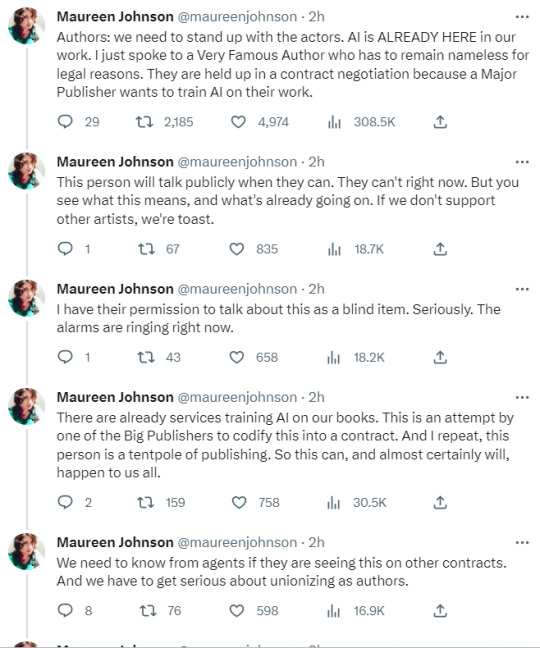
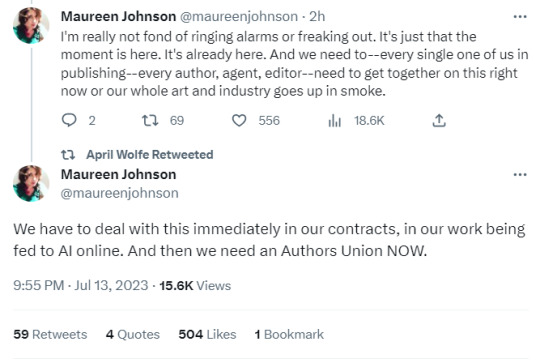
Alarm bells being rung by Maureen Johnson on AI and the Big Publishers
#I've already got academics wanting it put into their contracts that their work CAN'T be used to train AI#This is a scary time#ai MUST be regulated#on publishing#wga strike#sag aftra strike#sag-aftra strike#AUTHORS UNIONIZE
27K notes
·
View notes
Text
trust fund baby colin bridgerton becoming the trophy husband of self-made ceo millionaire penelope featherington and then also getting her pregnant with a boy who becomes the heir to an entire estate and title, like damn he really is the nepo baby final boss.
#bridgerton#polin#colin bridgerton#he’s also a published author#you can call him whatever you want but you can never call him broke
2K notes
·
View notes
Text
993 notes
·
View notes
Note
Pretty bold of you to put your AO3 handle in your Instagram bio. Especially when you’ve been writing there for 10+ years. I would never. lol.
Skill issue.
I have no guilt in my pleasures and no shame in my progress.
#Sure some of my fic writing is cringe but so is some of my published writing#My fic is made with love and brings both me and others happiness#Why shouldn’t I advertise it?#Why shouldn’t I be proud of it?#So what if some of it sucked. I got better.#Myfic#author things#Ao3#fic#transformative work
947 notes
·
View notes
Note
I love ur Lois so much!!! Lois has always reminded me of my mom and so seeing your version of Lois, one that faces similar uphill battle when it comes to work and how you can start sanding yourself down to try and get further, is amazing and touching. Can't wait to see more of this Lois, especially as she works up the ranks!

Thank you! I think that part of Lois (becoming less of yourself in order to move ahead in an industry, especially as a woman [of color]) is so underappreciated and should be explored way more.
#askjesncin#superman#clark kent#lois lane#clois#jl remix#i avoided doing a nervous sweating punchline are u proud of me#lois liando's been a nice creative outlet for some of the angst I go through in publishing as an author. the challenges and struggles
2K notes
·
View notes
Video
tumblr
🤷♂️publishing can’t ask us to write bestsellers for them on no money
#video#tiktok#tiktoks#story time#wtf#publishing#book#books#writer#writers#author#authors#iron widow#heavenly tyrant#zachary ying and the dragon emperor#xiran jay zhao#xiranjayzhao
13K notes
·
View notes
Text
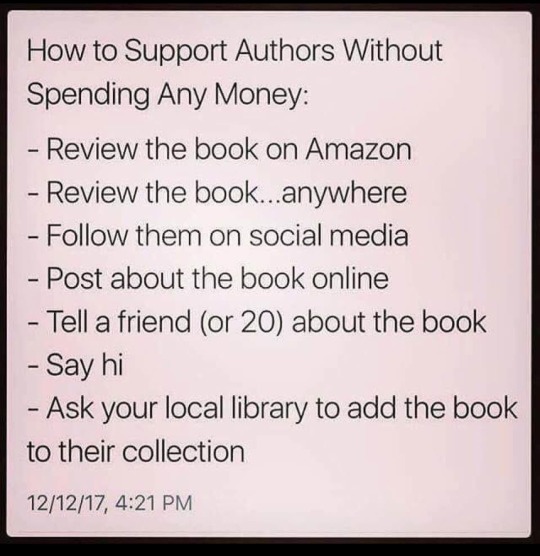
#writing#writing community#authors#publishing#support your local writer#indie authors#author community#writblr
514 notes
·
View notes
Text
Master Dialogue Writing Techniques for Engaging Fiction (For Writers)
(Beware, long post!)
As fiction writers, we all know that effective dialogue is essential for bringing our stories and characters to life. After all, the way our protagonists, antagonists, and supporting players speak to one another is one of the primary ways readers get to know them on a deep, intimate level. Dialogue reveals personality, uncovers motivation, and propels the narrative forward in a way that felt narration simply can't match.
But nailing natural, compelling dialogue is easier said than done. It's a craft that takes serious skill to master, requiring writers to have a keen ear for authentic speech patterns, a nimble handle on subtext and implication, and the ability to strike that delicate balance between being true to real-world conversation while also keeping things snappy, dynamic, and laser-focused on the story at hand.
If you're someone who struggles with crafting dialogue that truly sings, never fear. In this in-depth guide, I'm going to dive deep into the techniques and best practices that will help you elevate your dialogue writing to new heights. By the end, you'll have a toolbox full of strategies to ensure that every exchange between your characters is as gripping, revealing, and unforgettable as possible.
The Fundamentals of Effective Dialogue
Before we get into the more advanced nuances of dialogue writing, let's start by covering some of the foundational principles that all great fictional conversations are built upon:
Reveal Character One of the primary functions of dialogue is to give readers a window into who your characters are as people. The way they speak — their word choices, their tone, their body language, their turns of phrase — should provide vivid insight into their personalities, backgrounds, values, quirks, and emotional states.
Think about how much you can glean about someone just from how they communicate in real life. Do they use a lot of slang and shorthand? Are they verbose and flowery with their language? Do they struggle to make eye contact or fail to respond directly to questions? All of these subtle linguistic cues are powerful tools for crafting multi-dimensional characters.
Drive the Plot Forward While revelations about character are crucial, you also want to ensure that your dialogue is constantly pushing the story itself forward. Each exchange should feel purposeful, moving the narrative along by introducing new information, triggering plot points, creating conflict, or prompting characters to make pivotal decisions.
Dialogue that feels aimless or extraneous will ultimately bore readers and detract from the forward momentum of your story. Every line should have a clear intent or function, whether it's uncovering a hidden truth, setting up a future complication, or escalating the tension in a high-stakes moment.
Establish Distinct Voices In a story featuring multiple characters, it's crucial that each person has a clearly defined and differentiated way of speaking. Readers should be able to tell who's talking just from the rhythm, diction, and personality of the dialogue, without any additional context clues.
This doesn't mean every character has to have an over-the-top, hyper-stylized way of communicating. In fact, the most effective character voices often feel grounded and natural. But there should still be distinct markers — whether it's word choice, sentence structure, tone, or speech patterns — that make each person's voice instantly recognizable.
Convey Subtext While the literal words being spoken are important, great dialogue also traffics heavily in subtext — the unspoken emotional undercurrents, power dynamics, and hidden agendas that simmer beneath the surface of a conversation.
The most compelling exchanges happen when characters are communicating on multiple levels simultaneously. Perhaps they're saying one thing out loud while their body language and tone convey a completely different sentiment. Or maybe they're engaged in a subtle war of wits, trading verbal jabs that reveal deeper wells of resentment, attraction, or vulnerability.
Mastering the art of subtext is key to creating dialogue that feels layered, lifelike, and imbued with dramatic tension.
Strategies for Writing Snappy, Realistic Dialogue
Now that we've covered the foundational principles, let's dive into some specific techniques and best practices that will take your dialogue writing to the next level:
Omit Unnecessary Details One of the biggest mistakes many writers make with dialogue is bogging it down with too much extraneous information. In real life, people rarely speak in perfectly composed, grammatically correct full sentences. We stumble over our words, interrupt each other, trail off mid-thought, and pack our speech with filler words like "um," "uh," and "you know."
While you don't want to go overboard with mimicking that messiness, you should aim to strip your dialogue of any overly formal or expository language. Stick to the essentials — the core thoughts, feelings, and information being exchanged — and let the subtext and character voices do the heavy lifting. Your readers will fill in the gaps and appreciate the authenticity.
Master the Art of Subtext As mentioned earlier, crafting dialogue that's rich in subtext is one of the keys to making it feel gripping and lifelike. Think about how much is often left unsaid in real-world conversations, with people dancing around sensitive topics, conveying hidden agendas, or engaging in subtle power struggles.
To layer that sense of unspoken tension into your own dialogue, consider techniques like:
• Having characters contradict themselves or say one thing while their body language says another
• Utilizing loaded pauses, interruptions, and moments of uncomfortable silence
• Injecting subtle sarcasm, skepticism, or implication into a character's word choices
• Allowing characters to talk past each other, missing the unspoken point of what the other person is really saying
The more you can imbue your dialogue with that layered, emotionally-charged subtext, the more it will resonate with readers on a deeper level.
Establish Distinct Voices As mentioned earlier, ensuring that each of your characters has a clearly defined and differentiated speaking voice is crucial for great dialogue. But how exactly do you go about accomplishing that?
One effective strategy is to give each person a unique set of verbal tics, idioms, or speech patterns. Maybe one character is prone to long-winded, flowery metaphors, while another speaks in clipped, efficiency-minded sentences. Perhaps your protagonist has a habit of ending statements with questioning upticks, while the sarcastic best friend always punctuates their barbs with an eye roll.
You can also play with differences in diction, syntax, and even accent/dialect to further distinguish how your characters communicate. The key is to really get to know the unique personality, background, and psychology of each person — then let those elements shine through in how they express themselves.
Lean Into Conflict and Confrontation When it comes to crafting gripping dialogue, conflict is your friend. The most compelling exchanges often arise from characters butting heads, engaging in verbal sparring matches, or working through deep-seated tensions and disagreements.
Conflict allows you to showcase the high stakes, unresolved needs, and deeper emotional currents that are driving your characters. It forces them to make bold choices, reveals aspects of their personalities that might not otherwise surface, and generates the kind of dramatic tension that will really hook your readers.
Of course, you'll want to avoid making every single dialogue scene a full-blown argument. But learning to sprinkle in well-placed moments of friction, confrontation, and clashing agendas is a surefire way to elevate the energy and impact of your character interactions.
Read Your Dialogue Out Loud One of the most valuable tricks for ensuring your dialogue sounds natural and lifelike is to read it aloud as you're writing. Hearing the words out loud will quickly expose any clunky phrasing, overly formal grammar, or inauthentic rhythms that would otherwise go unnoticed on the page.
Pay close attention to how the dialogue rolls off your tongue. Does it have a smooth, conversational flow? Or does it feel stilted and unnatural? Are your characters' unique voices shining through clearly? Are there any spots where the back-and-forth starts to drag or feel repetitive?
Actively listening to your dialogue — and making adjustments based on how it sounds in the real world — is an essential part of the writing process. It's one of the best ways to refine and polish those character interactions until they feel truly alive.
Hopefully, this can help you all!
The key is to always keep your focus on authenticity. Ask yourself: how would real people actually speak?
Hey fellow writers! I'm super excited to share that I've just launched a Tumblr community. I'm inviting all of you to join my community. All you have to do is fill out this Google form, and I'll personally send you an invitation to join the Write Right Society on Tumblr! Can't wait to see your posts!

#writing#thewriteadviceforwriters#writeblr#creative writing#writing tips#on writing#writers block#how to write#writers and poets#writers on tumblr#authoradvice#author#fiction#indie author#writer#publishing#book writing#book quote#bookblr#books#writing advice#fiction writing#writing blog#writing tools#writing resources#novel writing#writer community#fantasy novel#readers#reading
867 notes
·
View notes
Text
I was already on a hair trigger today trying not to snap at a mutual for reblogging a "fuck authors who use Amazon" post, but, like, this shit is why some authors can only afford to use Amazon.
They don't have the $75+ to distribute through Ingram Spark. They don't have the $25 it takes to change your files if you need to update them after they've been accepted. They can't afford to take the cost of printing hit to their sales. They can't afford to lose an additional 40% of their income to retailer discounts.
And just so we're clear, Ingram isn't a vanity publisher. They're one of the largest print monopolies in the world. They're used by most mainstream traditional publishers and indie and self-pub authors alike. Amazon uses them when their print demand is too high.
My friend, whose work is published by Gollancz, is printed through Ingram, the same as mine. The difference is their publisher takes the hit for them. In theory. We won't get into dwindling advances here or how publishers are increasingly putting the onus of marketing and sales onto their authors or the fact that their editors can't afford rent or food while the executives get richer and richer.
So what do you do when the mainstream doesn't want you? What do you do when you're told if you can't keep up with the rat race, that you don't deserve to have your work published? What do you do if all you have is the ability to tell stories for a living, and no one wants you?
Well, you could die of starvation. I'm sure there are several people on here who'd be happy if that happened to me. (I know. Because they tell me. Often.) Or, you can shake hands with the devil, knowing it's a bum deal, knowing everything is fucked, but also knowing that every other aspect of this fucking industry is just as fucking bad.
There's no escape. It's relentless.
And you've got people out there posting things like, "Actually, I think authors who charge for their books are part of the problem."
And yeah, in an ideal world, I'd be making art for art's sake.
But we're not in that world. We're in the bad place, and you're actively making it worse. You're encouraging people to steal from people who are struggling just like you and calling it activism against billionaires or putting them in the same moral category as said billionaires as though we're not trapped in this system, same as you. Some of you are fellow fucking authors. And, like, my mind boggles at what it would take to stab a fellow creative in the back like that, but here we are.
Hell world.
#long post#vent post#publishing#author stuff I get#anyone clowning on this post gets put in the wood chipper
4K notes
·
View notes
Text
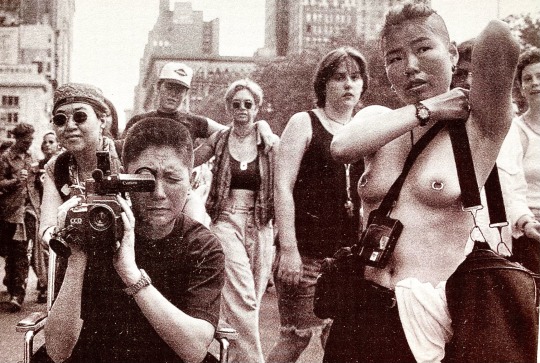
"Dyke March 1994" by Morgan Gwenwald
source: The Wild Good: Lesbian Photographs & Writings on Love, edited by Beatrix Gates
#lesbian#lesbian literature#dyke#dyke literature#archived#thatbutcharchivist#dyke march#dyke march 1994#lesbian history#lesbian photography#author: beatrix gates#photographer: morgan gwenwald#the wild good#year: 1996#publisher: anchor books#publisher: doubleday dell publishing group inc.#butch#butch dyke#butch lesbian#why does it look alright while i'm editing and then hitting the finished button is like unleashing an entirely different monster#ai yai yai#i'll figure it out#asian lesbian
24K notes
·
View notes
Text
I keep seeing posts talking about the WGA/Sag-Aftra strike, which yes, good, but in all this "support writers" sentiment I'm seeing no one talk about book writers, which I think is something people should know more about right now.
We are at an all-time high for book bans, namely targeting queer & PoC-authored books. This means that a lot of schools and libraries are no longer stocking diverse YA books, and if you're not in publishing, you may not realize this but school & libraries are by far one of the biggest markets for diverse YA books.
This means that in 2023, YA book sales are down. This is also in part because Barnes & Noble (the largest physical book retailer in the U.S.) is no longer really stocking YA hardcovers. This means that marginalized authors and debut authors are struggling to sell books.
But it's a LOT worse than that. In the past couple of years, marginalized authors are *really* struggling to get new book deals. Most books are acquired by a publisher about 2 years before they release to the public, so this isn't all that noticeable yet, but a LOT of marginalized authors I've spoken to (myself included) have been unable to sell a new YA book since 2020. So while I had a book out last year, even if I sell one right now, you won't see it until 2025-2026. That's three to four years without a new release or the income I get from publishing those books.
On top of that, Big 5 publishers have started closing imprints (namely their diverse imprints) and have started telling their marginalized YA authors to just go. I've had multiple authors tell me their publisher basically said, "eh, we don't care to put in the work for you anymore. You can just go somewhere else". Of the authors who *are* getting offered new contracts, we're being offered pay far below the cost of living and we're being handed contracts that split our payments 4 or 5 ways and require we sign over our work to be used to train AI so they can replace us a few years down the road.
Authors are freelancers who own our IPs, which means we can't unionize the way Hollywood writers can, and despite authors showing up in droves to support HarperCollins employees when they went on strike for fair wages, we're being hung out to dry when it comes to our own rights.
If you enjoy diverse books, especially diverse YA, please understand that many of the authors you loved over the past 3-5 years are being forced out of the industry. We're being exploited, and we have no way to defend ourselves. Our books sales are drying up thanks to anti-queer legislation, our rights are being eaten up by AI, and our publishers are degrading us while profiting of us and refusing to share those profits with us.
Within the publishing industry, we've all been watching this decline happen over the last decade, but outside of it, I know most people have no idea what's going on so please spread the word. And if you care about diverse books especially in YA, please support marginalized authors in any way you can. The industry needs to be reminded that it needs us before we're all eliminated from it.
#Books#diverse books#author#publishing#sag aftra#writers strike#writers#labor rights#workers rights#wga strike
7K notes
·
View notes